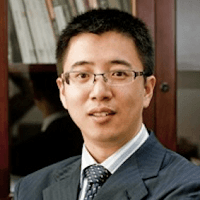
Yanyi Huang ScD
Biochemistry and Molecular Genetics
Beijing, Beijing, China
Connect with the speaker?
Professor Yanyi Huang received his BS (Chemistry) and ScD (Inorganic Chemistry) degrees from Peking University in 1997 and 2002, respectively. He then conducted his postdoc research at Caltech (Applied Physics, 2002-2005) with Amnon Yariv, and at Stanford (Bioengineering, 2005-2006) with Stephen Quake. He started his independent career at Peking University in 2006 as a Principal Investigator and then promoted to Associate Professor in 2009, and Professor in 2013. Now he is a Principal Investigator in Beijing Advanced Innovation Center for Genomics (ICG), Professor of Department of Materials Science and Engineering, Principal Investigator in Biomedical Pioneering Innovation Center (BIOPIC), Principal Investigator in Peking-Tsinghua Center for Life Sciences, Adjunct Professor of Analytical Chemistry, and Cooperative Principal Investigator of Chinese Institute for Brain Research, Beijing.
Professor Huang has published over 150 papers. He has received National Natural Science Award, 2nd Rank, in 2003, the National Excellent Doctoral Thesis Award in 2004, the Fok Ying Tung Education Foundation Young Investigator Award in 2010, The NSFC Award for Excellent Young Scholars in 2012, and the NSFC Award for Distinguished Young Scientist in 2015. He became a Fellow of the Royal Society of Chemistry in 2014. He has been actively serving the community including sitting on the Advisory Board of Lab on a Chip, the Editorial Board of Biomicrofluidics, and Science China Life Sciences, and the Features Panel of Analytical Chemistry.
Huang group is working on technology development for integrative biology researches, especially the new methods for single-cell analysis, genomic sequencing, and large-scale microfluidics, as well as the bioanalytical instrumentation. We are interested in developing advanced technologies to facilitate genome sequencing and its applications. Huang lab has developed numerous key components, structures, functional modules, and fabrication methods to enhance the complexity and sophistication of experiments that can be performed on a microfluidic chip. The advantages of these micro-scale building blocks enable quantitatively more and qualitatively new measurements, including the single-copy measurements, of complex biological systems.
These developments enable researchers to perform experiments that are impossible or impractical to execute with traditional benchtop techniques and to provide innovative solutions to compelling problems which will yield fundamental insights into important biological problems. Huang lab has also developed microfluidic circuits for more precise characterization of heterogeneous systems at the single-cell resolution using high-throughput sequencing technologies, allowing cells to be identified objectively without a priori knowledge. Recently, the Huang group has developed a new strategy to perform super-high accuracy DNA sequencing with information redundancy. This technology, ECC sequencing, will further facilitate the researches that require accuracy that cannot be offered by current methods.
Professor Huang has published over 150 papers. He has received National Natural Science Award, 2nd Rank, in 2003, the National Excellent Doctoral Thesis Award in 2004, the Fok Ying Tung Education Foundation Young Investigator Award in 2010, The NSFC Award for Excellent Young Scholars in 2012, and the NSFC Award for Distinguished Young Scientist in 2015. He became a Fellow of the Royal Society of Chemistry in 2014. He has been actively serving the community including sitting on the Advisory Board of Lab on a Chip, the Editorial Board of Biomicrofluidics, and Science China Life Sciences, and the Features Panel of Analytical Chemistry.
Huang group is working on technology development for integrative biology researches, especially the new methods for single-cell analysis, genomic sequencing, and large-scale microfluidics, as well as the bioanalytical instrumentation. We are interested in developing advanced technologies to facilitate genome sequencing and its applications. Huang lab has developed numerous key components, structures, functional modules, and fabrication methods to enhance the complexity and sophistication of experiments that can be performed on a microfluidic chip. The advantages of these micro-scale building blocks enable quantitatively more and qualitatively new measurements, including the single-copy measurements, of complex biological systems.
These developments enable researchers to perform experiments that are impossible or impractical to execute with traditional benchtop techniques and to provide innovative solutions to compelling problems which will yield fundamental insights into important biological problems. Huang lab has also developed microfluidic circuits for more precise characterization of heterogeneous systems at the single-cell resolution using high-throughput sequencing technologies, allowing cells to be identified objectively without a priori knowledge. Recently, the Huang group has developed a new strategy to perform super-high accuracy DNA sequencing with information redundancy. This technology, ECC sequencing, will further facilitate the researches that require accuracy that cannot be offered by current methods.
EVENTS & ACTIVITIES (Speaking, Spoken, and Authored)
EMBL Conference : Microfluidics 2016
In-Person Event
Biotechnology
Jul 24 - 26, 2016
Heidelberg, Baden-Wurttemberg, DE
Genomics and Big Data Summit 2016
In-Person Event
Genetics
May 25 - 27, 2016
Boston, Massachusetts, USA
6th Next Generation Sequencing Conference
In-Person Event
Biochemistry and Molecular Genetics ...
May 25 - 26, 2016
Boston, Massachusetts, USA

